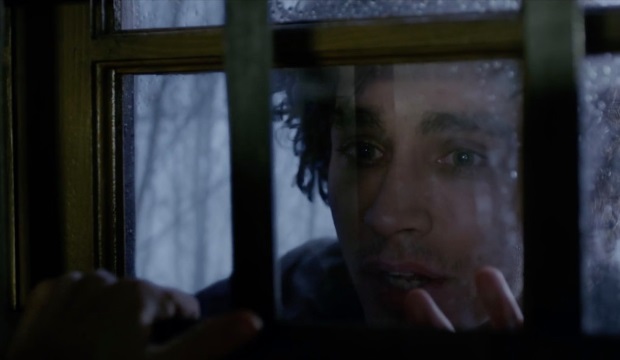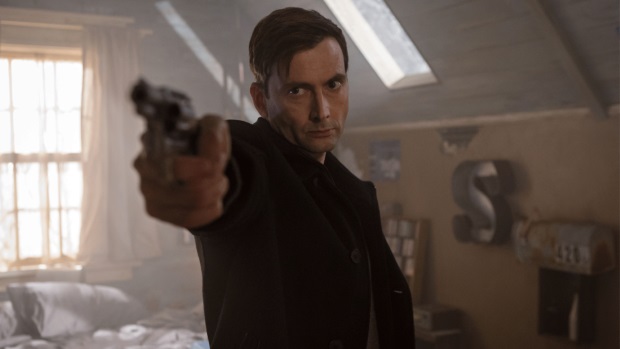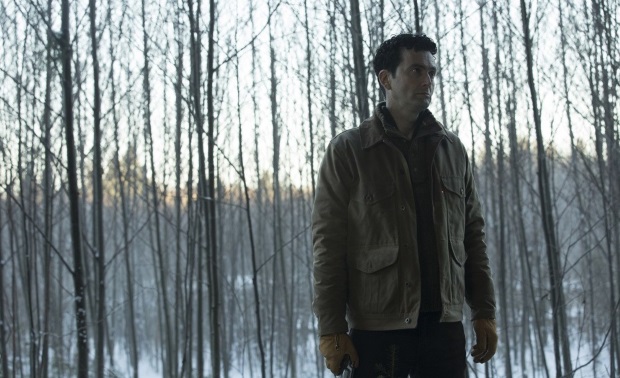Dean Devlin interview: David Tennant, Bad Samaritan, Geostorm, Doctor Who and more
We chat to the Bad Samaritan director about David Tennant, fan movies, and creating atmosphere on screen...
Dean Devlin – the producer of films such as Stargate and Independence Day – didn’t have the most comfortable entry into the world of directing movies. His debut feature, Geostorm, was finished by somebody else, and Devlin himself has all but disowned it. For his second, though, he wanted something smaller, and that he had more control over. Step forward Bad Samaritan, starring David Tennant and Robert Sheehan. And he spared us some time for a natter about it…
If we can start with the scene-setting basics, because I think you haven’t answered this question 54 times. Where did Bad Samaritan come from, and why did you decide you wanted to devote a slice of your life to it?
I’ve been friends with the writer, Brandon Boyce, for a long time. Ever since he wrote Apt Pupil. Which is a movie I loved. It presented evil in a way I hadn’t seen in cinema before. And it did it in the way I see it in real life. I found it much more frightening that movie evil.
We’ve been friends for years, and a few years back he called me up and said he’d just finished a new screenplay. He was about to send it out, but would I read it first and give him notes? I said to him I only have one note: don’t show this to anyone, as I want to make this movie! I bought the script from him. I thought it was fresh, interesting, and it reminded me of films I’d watch growing up. Plus it was something I’d never done before. An amazing challenge, and I got very excited about making it.
Your two leads, David Tennant and Robert Sheehan, then. I always remember Barry Norman here in the UK reviewing The Fugitive, a film he liked. But he argued that the film would have been better had Harrison Ford and Tommy Lee Jones changed roles. That the characters were that smooth, really. With David and Robert, though, you have two leads here whose morality is skewed.
Right, right.
I don’t like either of their characters at first, and neither is squeaky clean.
I think that had this movie been developed at a Hollywood studio, there would have been an effort to make the lead more likeable. He would have been taking care of his elderly grandmother, while volunteering at the orphanage, while taking care of puppies. You’d have really liked him before all of this stuff happened. And I was more interested in someone who was a little bit more morally flawed, and had to confront that flaw, and make a decision on who he is.
In life, we’ve all made mistakes. We’ve all done things we’ve regretted. The big question is how do you react when you do it? Do you rationalise the behaviour and move on with life? Or do you look at it honestly and say I do not want that decision to define me as a human being. That’s what I found compelling about the story. He’s living fast and loose, and not really thinking about his own morality. Until he’s confronted with genuine evil. He makes the single worst decision of his life, and then has to decide what kind of man is he? He decides he’s willing to risk everything, including his own death, to erase the worst decision he ever made.
I found that to be much more compelling than someone who’s basically good, doing good things.

The first act of the film puts those crumbs together. From the sounds of it, that was in the script?
The script was not overhauled. There were changes we made. Brandon was with me every step of the way. He was on set every day. He’d done a remarkable job building it. The biggest changes were that it originally took place in Los Angeles, and the character was American. I thought it was more visually interesting and intense to shoot in Portland. I thought, too, by changing Robert’s character to Irish, him being a thief may come across a little more roguish than criminal. I thought it also ramped up the stakes, because he easily could be reported for this. All cards on the table, I’d already seen Misfit and was crazy about Robert Sheehan. I wanted him for the part from day one. I did have it rewritten for him!
What’s often forgotten about your body of work is that you came from independent cinema in the first place, with Stargate…
Stargate, at the time, was the most expensive independent movie ever made!
Would you say, then, that the foundation of your company, Electric Entertainment, was the real turning point though? For a storyteller looking to retain control over what was on the screen?
Without a doubt. But I also discovered along the way my own character flaws.
Part of my character flaw was that it became very apparent to me that I was not well equipped to make films for other people. When I looked at the work I’d done that I liked the most, it was those where I had the most freedom. By creating Electric Entertainment, we were able to create a playground where we had that freedom. I was very proud of the work we did her. I made a huge mistake after ten years of Electric Entertainment, going back to the studios and making two films. But it was a gigantic reminder of why I’m not built for that!
I am one of the world’s advocates for one of those films. I had a ball of a time with Geostorm, but I don’t think it’s much secret that you didn’t?
It’s very simple, and I’m not saying anything that’s not known. I was not involved in the film for the last two years of its making. We shot it, and edited it, and I don’t know if people would have liked the film I was going to make better or not, but the film that came out wasn’t the one I wanted to make. I probably should have taken my name off it, but I thought by doing so that could hurt the movie. I didn’t want to contribute to anybody losing money on a film that I’d originated. But the film that came out is not my film. If you like it, that’s great. I’m happy that you like it. But I just can’t take any credit for it.
Did you see the final version in the end at least?
I did.
The reason I ask about it is that I’ve spoken to directors before, and a few have told me that the film you choose to make next tends to be in some way influenced by the one that you’ve just done before. Is there an element of anti-reaction to Geostorm in choosing Bad Samaritan? That you needed that control back? And if that’s brought you to work with fan-driven companies like Legion M?
There’s no question. It had been a long time since I’d been at the studios. The experience was horrible for me, much worse than when I’d been at studios earlier. And quite honestly my confidence was shaken. I thought if I don’t get on this horse straight away, I might not get back on it. We came back to Electric Entertainment and I said I’m making this film next. It turned out to be one of the greatest experiences of my life. It was joyous.
The actors, it’s very rare, even in the best circumstances, that you get your first choice. But I got my dream cast. To work with David Tennant and Robbie was out of this world, I never thought I’d get them. It really was a palate cleanser, and of course it was a challenge. I’d never done anything in this tone, or like this before. Didn’t know if I could do it. In many ways it was the most rewarding experience of my career, and doing it after a very terrible experience, it really was a tonic.

Did it work, in terms of refuelling confidence?
Yeah. For me, for my crew. We all left that experience feeling very proud of what we had done. If people don’t like it fine, if they do, great. But this is the movie to judge my directing on.
You’re talking to a British website, you cast David Tennant, and you’re a Doctor Who nerd. There’s no way we’re avoiding a Doctor Who chat! Bad Samaritan I believe has got a 15 certificate in the UK, and that means that a generation who grew up with David as the Doctor are coming to the age where they can watch this.
[Laughs]
Obviously, David Tennant has done a wide range of stuff since. But still: you must have had fun subverting expectations again!
Well, I’ll tell you. The evolution is that I’m a huge fan of him as the Doctor. It blew my mind, I was desperate to work with him. But then I saw him in Broadchurch and saw a complexity in him that I didn’t know he had. I hadn’t seen his theatre work. Then, of course, the truly evil character of Kilgrave in Jessica Jones. I thought I don’t think I’ve ever seen an actor be so different so successfully. Usually an actor does a thing that we love. And then they want to stretch and do different kinds of roles, and we tolerate those other roles, and appreciate them. But we really love them in the one part. But with David, I see people who love him as much as Kilgrave as they did the Doctor, or in Broadchurch. Whatever he does, it generates passion from the fans that I’ve never seen before.
There was one Christmas in the UK where, in the space of a few days, David Tennant signed off as the Doctor, hosted one or two panel shows, read the bedtime story on CBeebies, and the BBC screened his take on Hamlet, that he did for the RSC. And they were all screened within days of each other at the end of 2009. It wasn’t just range, it was the speed of range too.
[Laughs]
And then on top of it, he may be the single nicest person I’ve ever worked with. I would have not have been upset if he’d have turned up and had an enormous ego. I would have expected it. But the most humble, sweetest, kindest man I think I’ve ever worked with.
Was he your Doctor, then?
No. Tom was my first one! Tom Baker. But I was actually living in London in 2005 making a film called Flyboys, when the show was rebooted with Eccleston. I was blown away by the reboot. I thought this is done with such love and passion. I didn’t find it to be cynical at all. I immediately fell in love with the show, came back to LA and told everyone they had to see it. And then of course the very next season was Tennant, and that just took the show to a whole other level for me. I loved Eccleston in the part, but for me, Tennant brought it back to something Tom Baker had done: the mad genius. It tickled me in a way I couldn’t get over.
You talk, then, about the passion running through Doctor Who. I’m curious how you found the company Legion M, then. The firm that’s effectively a mini-fan-driven movie studio?
It goes back to when I did Stargate. Stargate was an independent movie. Nobody wanted to release the film. We finally got MGM to put the movie out, but only because they had nothing else on the release schedule. They didn’t like the film very much, and didn’t believe in it. At the time, I knew they weren’t going to spend a lot of money to promote it, because it wasn’t their film, and they didn’t care for it. I asked them if I could have the sci-fi conventions, and could I have the internet. They said the sci-fi conventions are all yours, but what is this thing called the internet? They’d never heard of it. This was 1994, and we actually invented the world’s first movie website. There had been fan websites before, but this was the first official one. I spent a year going to every single Star Trek convention across the country, meeting with fans, talking about the movie, promoting it. Then the film had this tremendous opening, much bigger than the tracking. And it really got me to understand that there is a grass roots way of trying to market a film.
When we were doing Bad Samaritan, a man called Larry Gleason was helping on the picture, and he said you’ve really got to meet Legion M. As soon as he told me what they were doing, I thought it went right to the heart of what’s wrong with our business, and what our business needs. Right now if you try and sell a movie in Hollywood, it’s all about what’s the IP, what’s the pre-existing audience, how do we know that anybody is going to see it? Legion M’s attitude is we want to make movies for fans. What do they want to see? It’s a different mindset. It’s the mindset that I have.
We showed them the picture, they loved the picture, they wanted to get involved. And we worked together on promoting the film. This was a film that had virtually no money for advertising. Everything was word of mouth. It was such a joyous experience going to the conventions with them, working with them, and seeing what they were trying to do. After the film came out, they asked if I’d join their board of advisors, and I was happy to accept.
The interesting thing with your film and Legion M is that both are making their way to a big screen. There’s no obvious intent to make a film purely for VOD. With Bad Samaritan, for instance, you really use silence well. And cinemas are great for moments of silence. Is it important for you to get the movie on the big screen, and also, can you talk a little about directing sound?
I remember when I was a boy and I saw the first Star Wars film. I was listening to an interview with George Lucas and he said that he thought sound was 50% of the moviemaking. I’d never thought about it before that, but after he said, I must have watched Star Wars 100 times after that. I became aware of each sound. I began to realise the enormous impact sound had on it.
A few years later, my father was making a movie called My Bodyguard. I remember there was a scene in the movie where one of the characters was telling this story. And he grabs his friend and holds his friend. For some reason the scene wasn’t really working. I remember my father saying do we have the sound of a chain link fence? People said ‘what’? There’s no fence! But suddenly, it gave that scene this enormous impact. Nobody ever said where did that sound come from? It really started to get my mind going.
I think especially when you do a thriller, it’s in the silences and the quiet moments where you can really get your tension going.

Is that where the switch of location helps too? That you switched the story to a different locale from Los Angeles to somewhere quieter?
It was part of it, but the bigger issue for me was that when our villain begins to piece by piece take apart the life of our hero, in Los Angeles what he would be doing would not be a big deal. But having lived and worked with Portland for a long time, it’s a unique city. It has the tall buildings, a sports arena, the usual big city stuff. But at the end of the day, it’s a small town. Everybody knows everybody. For me it made it much more of a pressure cooker. In Los Angeles, I thought it could get lost in the thousands, millions of stories that happen every day here. But in Portland, it would be the biggest thing.
That’s why it’s important too to have so much exterior work in the film?
Yes, exactly.
Now that you’ve detoxed and rebooted, where does that leave you now as a storyteller, and the stories you want to tell? Are you surrounded now with a bunch of people you want to make more movies? And do you know what you want to do?
I know this will sound very superficial, but it is honest. I’ve come to realise that I have three interests when it comes to filmmaking.
Number one, I believe that people’s lives are hard. I want to make entertainment that’s fun. Number two, I’m addicted to the cheer moment. I love that moment when we scream ‘yes’. Third, I really want my entertainment to be emotionally moving. That tends to temper number one or two. It could be a TV show, a feature film. But I’m interested in anything that can give me all three of those things. I now work in a company that’s very supportive, surrounded by people who share that vision with me. That’s really all we try to do.
Dean Devlin, thank you very much.
Bad Samaritan is in UK cinemas from Friday.